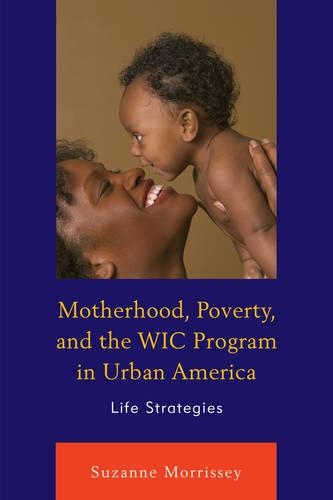
Motherhood, Poverty, and the WIC Program in Urban America: Life Strategies
(Paperback)
Available Formats
Publishing Details
Motherhood, Poverty, and the WIC Program in Urban America: Life Strategies
By (Author) Suzanne Morrissey
Bloomsbury Publishing PLC
Lexington Books
8th August 2017
United States
Classifications
Professional and Scholarly
Non Fiction
Central / national / federal government policies
Sociology: family, kinship and relationships
Urban and municipal planning and policy
307.116
Physical Properties
Paperback
286
Width 150mm, Height 229mm, Spine 23mm
440g
Description
The study presented here is one of urban poverty, household survival, and social institutions that both enable and control the decision-making of poor women in America. First and foremost, it is about a public health program, the Special Supplemental Nutrition Program for Women, Infants, and Children, known more commonly as WIC, and how the institution re-inscribes persistent stereotypes of the urban poor on the women it eagerly wishes to serve. Despite encountering opposition and occasionally humiliation at the hands of those chosen to serve, many low-income women throughout the United States and Puerto Rico return to WIC every month because it represents a rite of passage that characterizes pregnancy. Enrolling in WIC prenatally signifies to others the importance of providing for ones family in spite of socioeconomic disadvantage. Yet whether women access WIC benefits or not, their lived realities include a painful and enduring connection between urban poverty and health inequalities, particularly inequalities leading to poor birth outcomes and infant mortality, as explored in this urban ethnography.
Reviews
In this self-proclaimed 'classic ethnographic case study in urban anthropology,' anthropologist Morrissey examines how low-income minority women make use of the Special Supplemental Nutrition Program for Women, Infants, and Children (WIC). By interviewing women involved in the program in Syracuse, New York, she attempts to understand why some women at high risk for poor birth outcomes, which she defines as premature births and low-birth-weight births, used the program and others did not. Morrissey provides thorough histories of both Syracuse and WIC and a useful explanation of the programs structures and functions. Her qualitative study examines some of the barriers to participation in the WIC program, which include inconvenient hours, long waits for appointments, and the need for transportation, among many others.... Summing Up: Recommended. All levels/libraries. * CHOICE *
Dr. Morrissey has crafted a provocative, comprehensive case study of one of the largest maternal and child health programs in the United States. With a keen anthropological eye, Dr. Morrissey brings us inside bleak urban poverty, into the maze of a complex set of public services, and shows us how women and families living in such circumstances navigate the system, continually trying to meet their needs. Insightful and real, this ethnography gives us a glimpse into the lives around which so much effort in public health is organized. -- Timothy De Ver Dye, University of Rochester
Author Bio
Suzanne Morrissey is associate professor of anthropology and interdisciplinary studies and director of gender studies at Whitman College.
